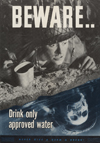A marketing survey by SDI Health, has been making the news rounds. According to the “Mobile & Social Media Study: PhysiciansÔÇÖ Views of Emerging Technology Survey,” 30% of physicians have used a smartphone to access medical applications. Of the physicians who own a smart phone, 95% have downloaded a medical application. The most popular applications were: Epocrates, Medscape, and Skyscape. The study was conducted in October 2009; I wonder how much those numbers have jumped in the last 8 months. For more information on mobile resources, check out the Libraries’ guide.

Drink Only Approved Water
The History of Medicine Division of the National Library of Medicine has a new online exhibit, the Iconography of Contagion, an exhibition of twentieth century health posters. The exhibition offers some posters from NLM’s collection as well as an historical perspective on their necessity.
Liwei Chen, an LSUHSC School of Public Health faculty member is making news (WebMD, NPR, UPI, Reuters, and HealthDay News) because of her study on the connection between sugary drinks and blood pressure. The study (pdf) is in the “publish ahead of print” section of Circulation. The study was released as a EurekAlert by LSUHSC Information Services.
Link to the pdf of the article is available to LSUHSC faculty, staff & students. It can be accessed off-campus with a valid LSUHSC library barcode & PIN. You can find more information at our remote access webpage.
College life can be overwhelming to some, with all the new responsibilities and challenges that one might face. Medline Plus offers several tips in order for college students to maintain healthy lifestyles, such as:
Getting enough sleep
Eating a balanced diet
Keeping up with vaccinations and checkups
Getting regular exercise
Making smart choices about alcohol and drugs
Practicing safe sex
Seeking help if you are depressed or stressed
Finding the right balance might be tough at first but once you implement these practices into your lifestyle you should remain healthy.
For more information visit:
http://www.nlm.nih.gov/medlineplus/collegehealth.html
A new paper published in PLoS Genetics has identified the gene that allows Schmidtea mediterranea to regenerate not only its limbs, but also its head and brain. The gene, called ÔÇ£smed-prep,ÔÇØ is similar to a gene found in humans, according to a Wired.com post.
The National Library of Medicine‘s Disaster Information Management Research Center
has created a new fact sheet on “Crude Oil Spills & Human Health.” The page is primarily an arranged group of links to other federal and state agencies.
Nasa’s satellite imaging photographed the oil slick in the Gulf of Mexico caused by the drilling platform accident last week. It was featured in their Image of the Day Gallery on Monday.

Oil Slick in Gulf
May’s issue of Clinical Infectious Diseases features a column on infectious diseases resources for the iPhone. You can read the entire article here. Two apps that may interest students are Microbiology Wiz with Immunology ($0.99) and Lange Microbiology and Infectious Disease Flash Cards ($34.99). Both are flashcard style review applications, allowing you to study microbiology on your iPhone.
Citation:
Surfing The Web: Infectious Diseases Resources for the iPhone
Richard L. Oehler, Kevin Smith, and John F. Toney
Clinical Infectious Diseases 2010 50:9, 1268-1274
Ever notice that sometimes it’s difficult to tell exactly which tooth is hurting when you have a toothache?
Researchers in Germany have studied just that issue and will soon publish an article in the journal Pain with thier conclusions. It would seem that when it comes to pain in the mouth, the brain doesn’t descriminate location nearly as well as it does in other regions of the body.
A summary of the research was recently posted to the Wired Science Blog. The article, currently only available as an electronic proof, will be published soon.
I sure hope the volunteer test subjects were well compensated for their participation!
Link to the pdf of the article is available to LSUHSC faculty staff & students. It can be accessed off-campus with a valid LSUHSC library barcode & PIN. You can find more information at our remote access webpage.
The official LSUHSC New Orleans twitter account posted a message this morning that read: Slobbery kisses from ‘man’s best friend’ aid #cancer research. #lifescience #research http://cli.gs/sveR7b. As a dog person, I’m all for research that benefits humans and their best friends.
And what do the pound signs mean before certain words in that message? The pound sign is called a hashtag and it allows those terms to be searched in twitter.
Nature.com has a special news section celebrating the Human Genome Project’s 10th anniversary. The contents are mostly included in the April 1st issue. They are asking scientists to participate in a survey to calculate the impact of the sequence.
Link to the pdf of the article is available to LSUHSC faculty staff & students. It can be accessed off-campus with a valid LSUHSC library barcode & PIN. You can find more information at our remote access webpage.
A new study published in Pharmacology, Biochemistry and Behavior finds that high fructose corn syrup leads to abnormal increases in body fat, at least in rats, when compared to regular table sugar.
Link to the pdf of the article is available to LSUHSC faculty staff & students. It can be accessed off-campus with a valid LSUHSC library barcode & PIN. You can find more information at our remote access webpage.
The latest issue of the Library’s Newsletter has been released. Archives of the newsletter are also available from 1998 to the present.
The Commonwealth Fund released a report mid-January on a 2009 Survey of Clinic Patients in New Orleans. “Coming Out of Crisis: Patient Experiences in Primary Care in New Orleans, Four Years Post-KatrinaÔÇöFindings from The Commonwealth Fund 2009 Survey of Clinic Patients in New Orleans” makes for interesting reading and is only 35 pages long. A quick quote that demonstrates the tone of the report, “The findings are encouraging: most patients reported having easy access to care, helpful communication with clinicians, good management of their chronic illnesses, and preventive care. When they needed care, costs did not deter them from seeking it.”
New Orleans was so busy with the Saints in the Superbowl and then Carnival that many missed that the Winter Olympics have started again. Experimental Physiology has issued a special themed issue (v95 n3 March 2010) in commemoration of the athletic event. The issue explores “the biological and environmental challenges elite winter athletes must overcome to win gold.”
Off campus access will require a Library barcode & PIN.

 myLSUHSC
myLSUHSC
